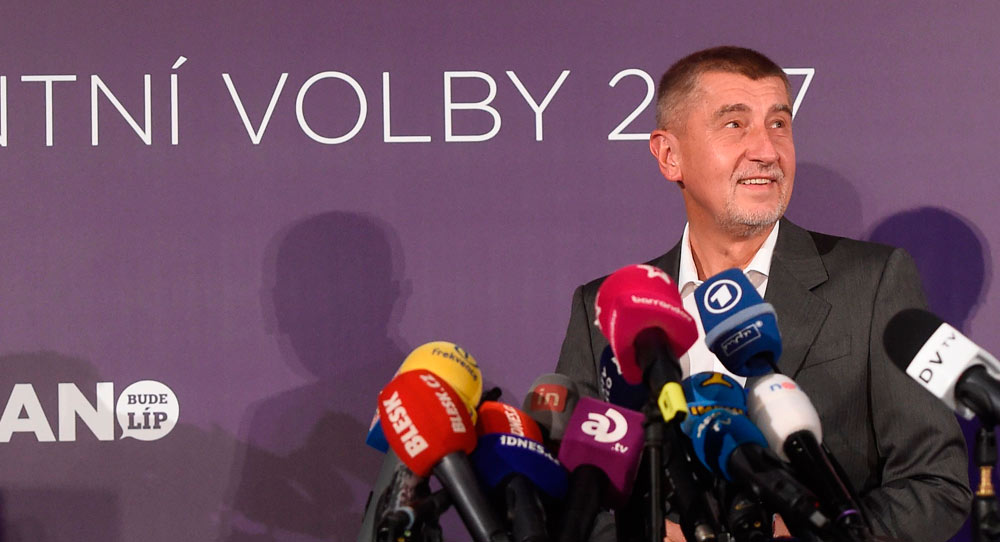Running on a populist ticket in which he promised to rid his country of shady politics, graft, and backroom deals, the billionaire finance minister Andrej Babiš now has to decide in which direction to steer the Czech Republic.
His party, ANO (which means “Yes” in Czech and is also an abbreviation for “Action by Dissatisfied Citizens”) won just shy of a whopping 30 percent of the vote—well ahead of all rivals.
While Babiš talks about defending his country’s interest in the EU and at the same time opposes adopting the euro currency, the finance minister’s task will be made no easier because of the reputation he has built up over the past few years and because of the state of Czech politics that he has inherited.
As the country’s second richest individual—thanks to building up his Agrofert group consisting of 250 companies ranging from chemicals, agriculture, and media interests—the Slovak-born Babiš has had his run-ins with the EU. These altercations are related to EU subsidies that were granted to a company that Babiš later acquired. The finance minister has repeatedly stated that the allegations are part of a conspiracy against him.
Then there is the political system itself.
Ever since Czechoslovakia peacefully split up in January 1993, both the Czech Republic and Slovakia have had their fair share of corruption and mediocre leadership, to say the least. In retrospect, the towering intellectual figure of Václav Havel, who was the last president of Czechoslovakia (1989-1992) and president of the Czech Republic (1993-2003), seems to have had minimal impact on this country.
Havel’s appeal for Central Europeans to find their place in the reunited Europe by defending their freedom, the democratic institutions, and the values they were so deprived of during the Cold War, has had little resonance in this special part of Europe.
If anything, the Visegrád Group of the Czech Republic, Hungary, Poland, and Slovakia have recently focused on opposing refugee quotas instead of working together to think and act strategically about the direction of the EU.
Indeed, looking at the record of the Visegrád Four, it is a catalogue of missed opportunities.
Because of the countries’ common past of being occupied by the former Soviet Union and its troops, the Visegrád Four had an immense opportunity to influence the debate in “old Europe.” In many ways they squandered it.
Their experiences of living under a one party state consisting of censorship and self-censorship, of not being allowed travel to the West, of being prevented from access to literature and opportunity, of its citizens being spied upon by their own secret police cannot be underestimated. All of these experiences had a profound effect on how these countries began to create politics and build new political institutions after 1989.
Despite the differences in the way the Visegrád Four coped with the post-Communist years—particularly over how they dealt with their Communist past—the countries shared a common goal.
It was to join the Euro-Atlantic institutions of NATO and the EU. In 1999, the Czech Republic, Hungary, and Poland joined NATO, followed by Slovakia in 2004. That same year all four countries joined the EU. Slovakia was the only one to adopt the euro in 2009.
Since then, with few exceptions, in the EU the Visegrád Four have failed to forge a common strategic stance over security, defense, and foreign policy. What is even more disappointing, given their geographic location and historical experience, is that the countries have no strategy toward Eastern Europe, let alone Russia.
Poland tried to carve out a role in the EU when the former Civic Platform government was in power from 2007 to 2015. Warsaw pushed hard for a common EU energy security policy and for a stronger European security and defense policy, sensing that the American security umbrella could not be taken for granted.
Perhaps that was the time for Poland to adopt the euro as its economy was strong. It was the only EU country that avoided a recession during the global financial crisis and the euro crisis. Joining the euro would have given Poland a special, important influence in the EU, given its size and its location.
That pro-European stance has been completely erased by the conservative-nationalist Law and Justice Party. Its leader, Jarosław Kaczyński, seems hell-bent on using the country’s institutions and the state-run companies to consolidate his party’s power. In doing so, Law and Justice has eroded Poland’s influence inside the EU. Yet Poland would not dare leave the union. It could not afford it. It has nowhere to go. Neither has Hungary nor the Czech Republic.
As a businessman Babiš knows that. The Czech economy is in good shape and the country’s budget is in surplus for the first time in two decades.
But it’s hard to know what Babiš means when the finance minister says he wants to defend his country’s interests in the EU, or where he stands with regard to more economic and political integration. Keeping the Czech Republic out of the eurozone does little to increase Prague’s influence in the union.
It is also difficult to see what kind of coalition Babiš will build. He has ruled out cooperation with the far-right, anti-EU Freedom and Direct Democracy Party that won over 10 percent of the vote or the Communist party that won 7.8 percent.
Whatever coalition Babiš forges, don’t expect the Czech Republic to begin to act strategically or shape any kind of strategic culture in the Visegrád Four. But then, apart from France, which EU country is talking strategy?







.jpg)
